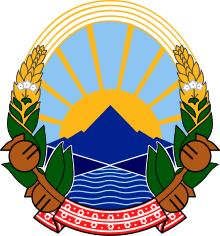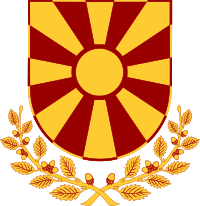Politics of the Republic of Macedonia
 |
| This article is part of a series on the politics and government of the Republic of Macedonia |
|
Politics in the Republic of Macedonia occur within the framework of a parliamentary representative democratic republic, whereby the Prime Minister is the head of government, and of a multi-party system. Executive power is exercised by the government. Legislative power is vested in both the government and parliament. The Judiciary is independent of the executive and the legislature.
Political System
The political system of the Republic of Macedonia consists of three branches: Legislative, Executive and Judicial. The Constitution[1] is the highest law of the country. The political institutions are constituted by the will of its citizens by secret ballot at direct and general elections. Its political system of parliamentary democracy was established with the Constitution of 1991, which stipulates the basic principles of democracy and guarantees democratic civil freedom. The Elections for Representatives in the Assembly of the Republic of Macedonia is held in October. The Assembly is composed of 120 Representatives, who are elected for a period of four years. Out of this number, 85 are elected according to the majority principle in 85 constituencies and 35 according to the proportional principle (the territory of the Republic of Macedonia representing one constituency). There are approximately 1.5 million voters registered in the General Electoral Roll for the election of Representatives in the Assembly of the Republic of Macedonia, assigned in 85 constituencies, in 2.973 polling stations. The voting for the Representatives according to the majority principle can be conducted in two electoral rounds, whereas the voting according to the proportional principle ends in the first round.[2]
Majority principle
85 Representatives - 85 Constituencies Out of 40 registered political parties, 28 have nominated candidates. 635 candidates have been proposed from 28 political parties, eight coalitions and eight private members. In the first round, the candidate who wins the majority of votes (50% of the total number of votes cast) will be elected, providing that the number of votes won is not less than 1/3 of the total number of registered voters in the constituency. Second round: If no candidate has won the required number of votes in the first round, the voting will be repeated in 14 days (1 of November, 1998). The first two candidates in a constituency, who have won the largest number of votes in the first round shall participate in the second round.The candidate who has won the largest number of votes from the votes cast in the second round shall be elected Representative.[2]
Proportional Principle
35 representatives - 1 Constituency 17 lists of candidates have been submitted from 22 political parties, out of which independently from 12 political parties, from four coalitions and from one group of voters, and the total number of nominated candidates is 595. The D’Hondt formula shall be applied for establishing the results of the vote. Only candidates’ lists, which have won at least 5% of the votes cast, may be represented in Assembly.[2]
Presidents
- Kiro Gligorov (1991–1999)
- Boris Trajkovski (1999–2004)
- Branko Crvenkovski (2004–2009)
- Gjorge Ivanov (2009–present)
Executive branch
| Office | Name | Party | Since |
|---|---|---|---|
| President | Gjorge Ivanov | VMRO-DPMNE | 12 May 2009 |
| Acting Prime Minister | Emil Dimitriev | VMRO-DPMNE | 18 January 2016 |
Although in Macedonian, these roles have very similar titles (Претседател на Република Македонија "President of the Republic of Macedonia" and Претседател на Владата на Република Македонија "President of the Government of the Republic of Macedonia") it is much less confusing to refer to them in English as President and Prime Minister respectively. These are also the terms used in the English translation of the constitution.
The President

- cannot hold any other public office or position in a political party
- is elected for a 5-year term and can serve a maximum of two terms
- is Commander-in-Chief of the Armed Forces and President of the Security Council
- nominates a candidate from the majority party or parties in the Assembly who then proposes the Government who are elected by the Assembly
- makes diplomatic appointments and some judicial and Security Council appointments
- grants decorations, honours and pardons[3]
The Government
The power of the President is fairly limited with all other executive power being vested in what the Constitution describes as the Government, i.e., the Prime Minister and Ministers.
Ministers:
- cannot be Representatives in the Assembly
- cannot hold any other public office or follow a profession while in office
- are elected by a majority vote in the Assembly
- are granted immunity
- cannot be called for service in the Armed Forces
- propose laws, budget and regulations to be adopted by the Assembly
- control diplomatic policy
- make other state appointments[3]
Current Cabinet
The current cabinet is a coalition of VMRO-DPMNE, the Democratic Union for Integration, the Socialist Party of Macedonia, and the Party for the Movement of Turks in Macedonia.
The members of the Cabinet of the Republic of Macedonia are chosen by the Prime Minister and approved by the national Parliament, however certain cabinet level positions are chosen by both President and Prime Minister, and approved by the Parliament.
| Member | Portfolio | Logo |
|---|---|---|
| Emil Dimitriev | Prime Minister | |
| Zoran Stavreski | Deputy Prime Minister in charge of Finance | |
| Musa Xhaferi | Deputy Prime Minister in charge of Framework Agreement Implementation |  |
| Vladimir Peševski | Deputy Prime Minister in charge of Economic Affairs |  |
| Dr. Fatmir Besimi | Deputy Prime Minister in charge of European Integration |  |
| Nikola Poposki | Minister of Foreign Affairs | |
| Zoran Jolevski | Minister of Defense | |
| Oliver Spasovski | Minister of Internal Affairs | |
| Blerim Bexheti | Minister of Justice |  |
| Vlado Misajlovski | Minister of Transport and Communication |  |
| Valon Saracini | Minister of Economy |  |
| Ljupčo Dimovski | Minister of Agriculture, Forestry and Watersupply |  |
| Nikola Todorov | Minister of Health |  |
| Pance Kralev | Minister of Education and Science |  |
| Ivo Ivanovski | Minister of Information Society |  |
| Nevzat Bejta | Minister of Local Self-Government |  |
| Elizabeta Kančeska Milevska | Minister of Culture | |
| Frosina Remenski | Minister of Labor and Social Policy |  |
| Abdilaqim Ademi | Minister of Environment and Physical Planning |  |
| Bill Pavleski | Minister for Attracting foreign investment |  |
| Hadi Neziri | Minister without Portfolio |  |
| Nedžet Mustafa | Minister without Portfolio |  |
| Vele Samak | Minister without Portfolio |  |
| Dimitar Bogov | Governor of the National Bank of the Republic of Macedonia |  |
| Ljupco Shvrgovski | Attorney General |  |
| Metodija Velichkovski | Chief of the General Staff of the Army of the Republic of Macedonia |  |
| Zoran Jolevski | Special Envoy and Chief Negotiator of the Macedonia name dispute |  |
Legislative branch

The Assembly (Sobranie) has 123 members, elected for a four-year term, by proportional representation.
Political parties and elections
| Candidate | Nominating party | First round | Second round | ||
|---|---|---|---|---|---|
| Votes | % | Votes | % | ||
| Gjorge Ivanov | VMRO–DPMNE | 345,850 | 35.04 | 453,616 | 63.14 |
| Ljubomir Frčkoski | Social Democratic Union of Macedonia | 202,691 | 20.54 | 264,828 | 36.86 |
| Imer Selmani | New Democracy | 147,547 | 14.95 | ||
| Ljube Boškoski | Independent | 146,878 | 14.88 | ||
| Agron Buxhaku | Democratic Union for Integration | 73,629 | 7.46 | ||
| Nano Ružin | Liberal Democratic Party | 40,042 | 4.06 | ||
| Mirushe Hoxha | Democratic Party of Albanians | 30,225 | 3.06 | ||
| Invalid/blank votes | 32,386 | 3.18 | 45,589 | 5.87 | |
| Total | 1,019,268 | 100.00 | 764,033 | 100.00 | |
| Registered voters/turnout | 1,792,082 | 56.9 | 1,792,082 | 42.6 | |
| Source: SEC, Nohlen & Stöver[4] | |||||
| Party/Coalition | Abbreviation | Number of votes | % of votes | Number of seats won | Seats change from dissol. |
|---|---|---|---|---|---|
| VMRO-Democratic Party for Macedonian National Unity, Socialist Party of Macedonia, Democratic Union, Democratic Renewal of Macedonia, Democratic Party of Turks of Macedonia, Democratic Party of Serbs in Macedonia, Union of Roma in Macedonia, | VMRO-DPMNE | 438,138 | 38.98 | 56 | |
| Social Democratic Union of Macedonia, New Social Democratic Party, Party for European Future, Liberal Party of Macedonia, | SDSM | 368,496 | 32.78 | 42 | |
| Democratic Union for Integration | DUI | 115,092 | 10.24 | 15 | |
| Democratic Party of Albanians | DPA | 66,315 | 5.90 | 8 | |
| National Democratic Revival | NDR | 29,996 | 2.67 | 2 | |
| VMRO – People's Party | VMRO-NP | 28,217 | 2.51 | 0 | 0 |
| New Democracy | ND | 19,958 | 1.78 | 0 | |
| United for Macedonia | OM | 17,081 | 1.52 | 0 | 0 |
| Liberal Democratic Party | LDP | 16,551 | 1.47 | 0 | |
| Political Party Dignity | PPD | 8,837 | 0.79 | 0 | 0 |
| Democratic Union of Albanians | DUA | 4,517 | 0.40 | 0 | 0 |
| Party of United Democrats of Macedonia | PODEM | 4,395 | 0.39 | 0 | 0 |
| Social Democratic Union | SDU | 2,270 | 0.20 | 0 | 0 |
| Social Democratic Party of Macedonia | SDPM | 1,807 | 0.16 | 0 | 0 |
| Democratic Right | / | 1,517 | 0.13 | 0 | 0 |
| National Democratic Union | NDU | 470 | 0.04 | 0 | 0 |
| Party for Democratic Prosperity | PDP | 277 | 0.02 | 0 | 0 |
| European Party of Macedonia | / | 130 | 0.01 | 0 | 0 |
| Total (turnout 63,48%) | 1,124,064 | 100 | 123 | |
- Source: State Election Commission of Macedonia[5]
Judicial branch
Judiciary power is exercised by courts, with the court system being headed by the Judicial Supreme Court, Constitutional Court and the Republican Judicial Council. The assembly appoints the judges.
Administrative divisions
With the passage of a new law and elections held in 2005, local government functions are divided between 78 municipalities (општини, opštini; singular: општина, opština. The capital, Skopje, is governed as a group of ten municipalities collectively referred to as "the City of Skopje". Municipalities in the Republic of Macedonia are units of local self-government. Neighbouring municipalities may establish cooperative arrangements.
Ethnic diversity
The country's main political divergence is between the largely ethnically-based political parties representing the country's Macedonian majority and Albanian minority. The issue of the power balance between the two communities led to a brief war in 2001, following which a power-sharing agreement was reached. In August 2004, the Republic's parliament passed legislation redrawing local boundaries and giving greater local autonomy to ethnic Albanians in areas where they predominate.
Foreign relations
The Republic is member of the ACCT, BIS, CE, CEI, EAPC, EBRD, ECE, FAO, IAEA, IBRD, ICAO, ICCt, ICRM, IDA, IFAD, IFC, IFRCS, ILO, IMF, IMO, Interpol, IOC, IOM (observer), ISO, ITU, OPCW, OSCE, PCA, PFP, UN, UNCTAD, UNESCO, UNIDO, UPU, WCL, WCO, WHO, WIPO, WMO, WToO, WTrO (observer)
References
- ↑ "Republic of Macedonia Constitution".
- 1 2 3 Macedonian Political System
- 1 2 Constitution of the Republic of Macedonia
- ↑ Nohlen, D & Stöver, P (2010) Elections in Europe: A data handbook, p2054 ISBN 9873832956097
- ↑ http://217.16.84.11/Default.aspx